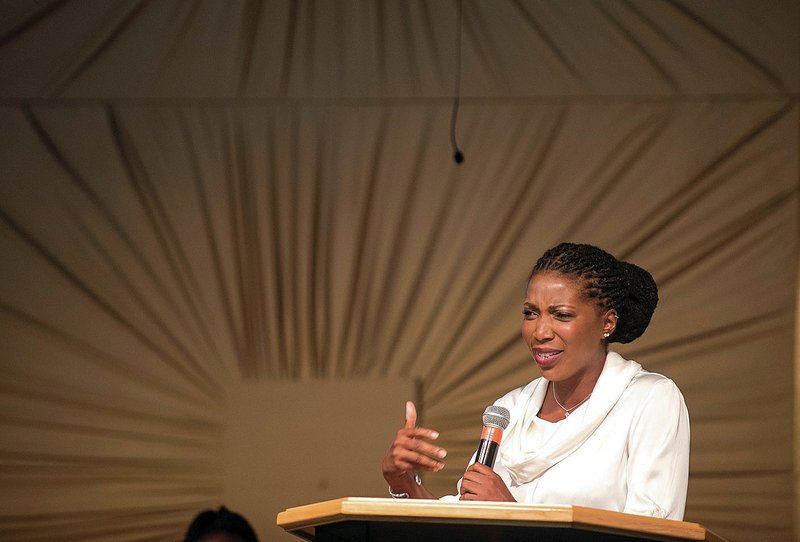FAYETTEVILLE -- There is no "only" in the phrase "Black Lives Matter," and support of the movement does not imply there is, a diverse group of 500 were told Monday night.
"What it means is that black lives matter also," said Circuit Judge Wendell Griffen of Little Rock, speaking to a crowd of about 500 at the St. James Missionary Baptist Church in Fayetteville. "If all lives matter, black lives matter. I learned that in logic at the University of Arkansas. Black lives matter because all lives matter."
Griffen was one of a panel of speakers brought to Monday night's event by the Black History Team of Compassion Fayetteville, a volunteer group. Other panelists were Caree Banton, University of Arkansas assistant professor of African American studies and history, and Raven Cook, a local Black History educator. The event began at 6:30 p.m. and lasted more than two hours.
Correction
The phrase “Black Lives Matter” does not imply that only black lives matter, speakers at a forum in Fayetteville said Monday night. The word “not” was omitted in a story Tuesday because of a grammatical error. The error has been corrected.
Fayetteville has been an open and inclusive community, but the Compassion group wanted to reinforce that, hold up the city as an example and hopefully be a good influence, said D'Andre Jones, spokesman for the Compassion group.
Black Lives Matter started as a movement after the acquittal of George Zimmerman, a neighborhood watch volunteer, in the shooting death of Trayvon Martin, Griffen said. Like 9/11 or other events for the rest of the population, black Americans "remember where they were and what they were doing when that acquittal happened" in 2012, he said.
Mayor Lioneld Jordan and police Chief Greg Tabor attended the meeting and stayed throughout. During it, Griffen said police as an institution in the United States has a history of being an agency of maintaining white supremacy, and the history of that cannot be wished away or ignored. Not only is there a history of injustice by police, but crimes against blacks by whites were never prosecuted vigorously, leading to an atmosphere of distrust, he and other panelists said.
Fayetteville police have a good history of even-handed justice, Tabor said after the meeting, but tensions from other parts of the country are often brought here. "I know police whose sons say they're afraid when they're stopped by police, and that just floors me," Tabor said. "Afraid to be stopped by police in Fayetteville? I couldn't believe it. But if they come here from places where the relations aren't as good, they're nervous when they're stopped. Then the officer who stopped them picks up on that, senses the nervousness and wonders 'Why are they nervous? What are they up to?' It's a cycle."
Cook told the audience her great-grandmother lost an eye to a severe beating during a robbery, when whites took her pay from a job as a domestic worker. Banton told the group changes that appear to be progress are discrimination taking new, more socially acceptable forms. For instance, blacks were denied the vote by slavery, then overt intimidation, then literacy tests and poll taxes, and now by large-scale incarceration and felony convictions.
"History won't let us go," Banton said. "We're pinned to it."
NW News on 08/23/2016
